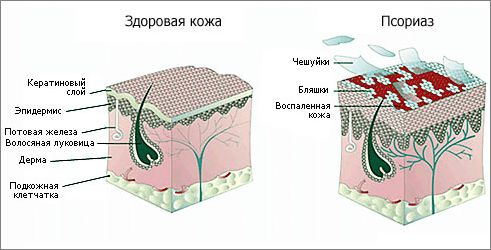There are many topical treatments for psoriasis today, including vitamin D analogs and glucocorticoids, but none of these treatments is universally effective for all patients.
The problem is probably that the causes of psoriasis are varied and not fully understood. Therefore, the treatment is mainly pathogenetic, and most often involves the suppression of the immune response, which is also fraught with certain complications.
According to recent findings, it has been found that a lipid that helps support skin cell metabolism can also help treat psoriasis. Read more about the discovery of scientists on estet-portal.com in this article.
Search for effective remedies for psoriasis
In psoriasis, there is an overgrowth and proliferation of keratinocytes, a violation of keratinization, and in the process, an increase in the production of antimicrobial agents and cytokines by skin cells. Thus, a vicious circle is started: skin cells produce cytokines, which cause immune cells to migrate, which, in turn, produce even more cytokines.
As a result, an inflammatory reaction develops, which is accompanied by the formation of psoriatic papules, and then plaques.
In recent studies, scientists have found that in both keratinocytes and inflammation-promoting immune cells, macrophages, the lipid phosphatidylglycerol suppressed the activation of toll-like receptors and, as a consequence, the activity of the inflammatory process.
Psoriasis treatment: experience with vitamin D
Phosphatidylglycerin against psoriasis: mechanism of action
Inflammation in the absence of infection is the hallmark of psoriasis. As a result, keratinocytes begin to actively divide, their differentiation and maturation are disturbed. Phosphatidylglycerin regulates this process, due to which keratinization is normalized.
Modern studies show that topical application of the lipid phosphatidylglycerol reduces inflammation as well as other manifestations of skin lesions in psoriasis.
Phosphatidylglycerol inhibits the activation of toll-like receptors by antimicrobial peptides produced by skin cells.

Toll-like receptors are a family of receptors that respond to both external stimuli and internal damage signals and then activate the immune response.
Read the latest articles in Telegram!
Prospects for the use of phosphatidylglycerol against psoriasis
In psoriasis, the so-called sterile inflammation develops, which is not associated with the penetration of infection, therefore, suppression of the immune response and has an effect in its treatment. Phosphatidylglycerol, in turn, due to its action on specific receptors, can provide a more pronounced result with fewer side effects.
The downside of phosphatidylglycerin is that this lipid does not penetrate well into the skin due to its large size.
In psoriasis, at the initial stages of treatment, when the barrier function of the skin is impaired, phosphatidylglycerol penetrates well, however, as the condition improves, lipid transport deteriorates.
Therefore, a search is underway for a form of phosphatidylglycerol that will easily pass through the natural barrier.
You may also be interested in: Helicobacter pylori: the impact of infection on the clinical course of psoriasis and eczema









Add a comment